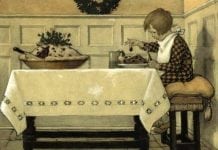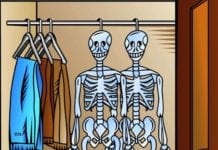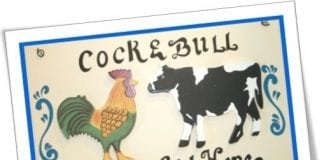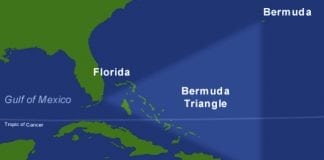To Chance Your Arm is to take an uncalculated risk, where the outcome is completely unknown. A blind bet, if you like.
There are several suggestions for the origin of this saying, one being that military men, whose rank was displayed in the way of stripes on their sleeves, would take battlefield risks, which could equally lead to promotion, demotion or death, depending upon the outcome.
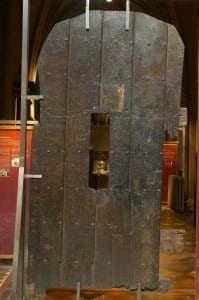 A better explanation (at least one that is more fun) dates back to Ireland as long ago as 1492. During a feud between two distinguished families, the Kildare’s and the Ormond’s, Sir James Butler, the Earl of Ormond, and his family took sanctuary inside St Patrick’s Cathedral in Dublin.
A better explanation (at least one that is more fun) dates back to Ireland as long ago as 1492. During a feud between two distinguished families, the Kildare’s and the Ormond’s, Sir James Butler, the Earl of Ormond, and his family took sanctuary inside St Patrick’s Cathedral in Dublin.
The Kildare’s took siege outside until Gerald Fitzpatrick, the Earl of Kildare, decided the feud had gone too far and attempted reconciliation. But the Ormond’s were suspicious of his offer of peaceful settlement and refused to leave the Cathedral.
As a desperate measure to prove his good intentions Fitzgerald ordered a hole to be cut into the Cathedral door and then thrust his outstretched hand through, putting his arm at the mercy of those inside as it could easily have been sliced off.
Instead Butler took his hand and peace was restored. It is not known if that is actually the origin of the phrase, but it should be. Either way, the exchange between Fitzpatrick and Butler definitely happened and the door with the hole is now on display at St Patrick’s Cathedral.
To Stage a Boycott would mean withdrawing from social or commercial arrangements as either a protest or punishment and the phrase is one of the few to emanate from Southern Ireland.
In the 1870’s Captain Charles Cunningham Boycott, an Englishman, was working as land agent for Lord Earne at Loughmask in County Mayo. In September 1880 a campaign, organised by the Irish Land League, was calling for a reform of the system of landholding and protesting tenants demanded Captain Boycott initiate a substantial reduction in their rents.
Boycott refused, even ordering anyone in arrears be evicted. In response Charles Parnell, the President of the Land League, made a speech calling for everybody in the local community, not only Boycott’s tenants, to refuse to have anything to do with the unpopular agent.
The result was that labourers refused to work for him, shop & inn keepers declined to serve either him or his family and even the postal staff refused to deliver his letters. Boycott had to go to the expense of having his food brought in, under guard, from great distances away and employed 50 labourers from as far away as Northern Ireland for the harvest, all protected by a guard of nine hundred.
This action by the locals was so successful, and aroused so much passion, (it was even reported in The Times of London during November 1880) that the Land League called upon all Irish men and women to treat similar landlords, or their agents, like ‘Boycott’.
Within weeks the phrase was adopted by newspapers around Europe and subsequently worldwide. By the time the Captain died in 1887, after fleeing back to England, the word had become a standard part of the English language.
A Square Meal is a phrase used to describe a good solid dinner. Often its origin has been confused with the four quarters of a good meal, i.e. meat, two veg and potatoes. In fact it is a nautical phrase dating back centuries.
Old battleships had notoriously poor living conditions and the sailor’s diet was equally as bad. Breakfast and lunch would rarely be any better than bread and water but the last meal of each day would at least include meat and have some substance.
Any significant meal eaten on board a ship would be served upon large square wooden trays that sailors carried back to their posts. The trays were square in design to enable them to be stored away both easily and securely and hence the phrase ‘A Square Meal’, meaning the substantial one, passed into parlance.
His Name is Mud is a derogatory phrase used to describe a person who is unpopular or out of favour. The obvious allusion is one of a person finding him or herself so low in society opinion that they are wallowing in the mud, but this is not the origin of the phrase. John Wilkes Booth assassinated the popular president, Abraham Lincoln, in Washington’s Ford Theatre on April 14 1865.
As he made his escape Booth broke his leg, but still managed to reach his horse and ride away to temporary safety. When he reached the countryside he looked for Dr Samuel Mudd who treated his injury.
 Mudd had no idea of the events of the evening but when he heard the following day of the assassination he immediately informed the authorities he had seen Booth. Despite his innocence the good doctor was arrested and later convicted for conspiracy and sentenced to life imprisonment.
Mudd had no idea of the events of the evening but when he heard the following day of the assassination he immediately informed the authorities he had seen Booth. Despite his innocence the good doctor was arrested and later convicted for conspiracy and sentenced to life imprisonment.
In 1869 Mudd was pardoned and released from jail, but the American public never forgave him for his implied involvement in the assassination plot. It would be another 100 years before Mudd was finally declared innocent and his family name was cleared during the 1970’s.
By Hook or by Crook is an expression we use to describe achieving something by any means possible, whether honest or not. There are two suggested origins for this expression and for the first we need to understand that the ‘hook’ in question is a blunt bill-hook and the ‘crook’ the hooked staff a shepherd used to gather his flock.
In feudal England during the Middle Ages, a law was passed preventing the cutting down of trees or lopping of branches to make firewood. But the law permitted the poor to gather dead wood from forests and deemed anything they could collect with a blunt hook or shepherd’s crook was allowable.
The Bodmin Register (1525) states: ‘Dynmure Wood is open to the inhabitants of Bodmin … to bear away on their backs a burden of lop, hook, crook and bag wood.’
The second suggested source for the expression takes us to Ireland, which during the 17th century had become the centre of Royalist activity and a potential base of operations for Charles Stuart, the son of Charles I, after the Parliamentarians came to power.
In 1649, the New Model Army planned an invasion, but Cromwell had been warned that Waterford City, in southern Ireland, was impossible to invade by sea as that would have meant sailing along the River Suir, which left the fleet vulnerable to attack.
Instead, Cromwell (see Warts and All) announced he would invade on the Wexford side of the city, from Hook Head, and from the west side at a place called Crook. ‘I will conquer Ireland by the Hook or by the Crook,’ he warned.
Both locations still appear on any detailed map of Ireland and the lighthouse at Hook Head claims to be the oldest in the British Isles.
When something is said to happen Once in a Blue Moon then it isn’t going to happen very often. The inference is that it never will. This has nothing to do with the colour of the moon or that on rare occasions light reflecting through smoke and dust particles caused a warm blue glow around the surface, most notably, after the eruption of Krakatoa in 1883 when the moon looked blue for nearly 2 years.
Instead, the origin of our phrase is much simpler that that and can be found in the Lunar Cycles.

We all know that every year there is one full moon in each month and all of these twelve moons have names, the Harvest Moon, the Hunters Moon, the Hay Moon and so on, and the dates they are due to appear are listed in red in the Maine Farmers Almanac. However, approximately seven times in every nineteen years there will be thirteen full moons in a given year.
This means that for one month in around thirty-three there are two full moons, the second of which doesn’t have a formal name but is listed in blue, not red, in the Almanac and so it became known as the Blue Moon (the rare one).
We have to wait a long time for something to happen under a Blue Moon – Albert Jack
Albert Jack AUDIOBOOKS available for download here

Money for Old Rope: The Big Book of Everything




